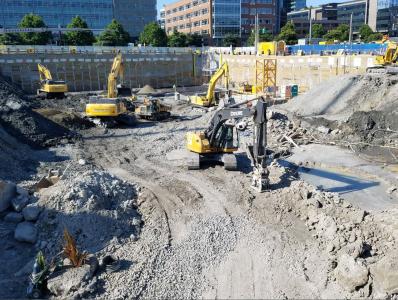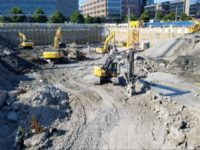Farallon performed environmental services, including due diligence, subsurface investigations, remedial investigations and cleanup feasibility studies, cleanup action planning, and construction support for cleanup conducted concurrently with construction at two city blocks. Farallon produced Phase I Environmental Site Assessment Reports, Remedial Investigation/Feasibility Study Reports, Cleanup Action Plans, Construction Progress Reporting, and Closure Reports for each of the two blocks.
During construction support, Farallon assisted the excavation subcontractor with segregation of various categories of soil and tracked the different categories from truck loading to final disposal, providing staff for both day and night shifts for the duration of construction excavation at both city blocks. Impacted soil was exported at the rate of about 3,000 tons per night per block. Farallon’s services for the client included obtaining disposal authorizations for five general categories of soil impacted with a range of hazardous constituents, including metals, petroleum, polynuclear aromatic hydrocarbons, and volatiles, and clean soil. Farallon located primary and alternate disposal facilities, including multiple Subtitle D-permitted facilities, a petroleum-contaminated soil facility, a Subtitle C-permitted facility, and several facilities accepting clean soil.
“This multitiered project was successful on several fronts,” said Farallon Principal Engineer and Hydrogeologist. “The client was pleased that Farallon field crews worked well with construction teams, minimizing construction delays. The day and night crews interfaced efficiently and assisted with appropriate disposal of many categories of waste going to different facilities at night. And Farallon provided the documentation required to obtain regulatory closure of the contaminated property under the Washington State Model Toxics Control Act Cleanup Regulation.”


